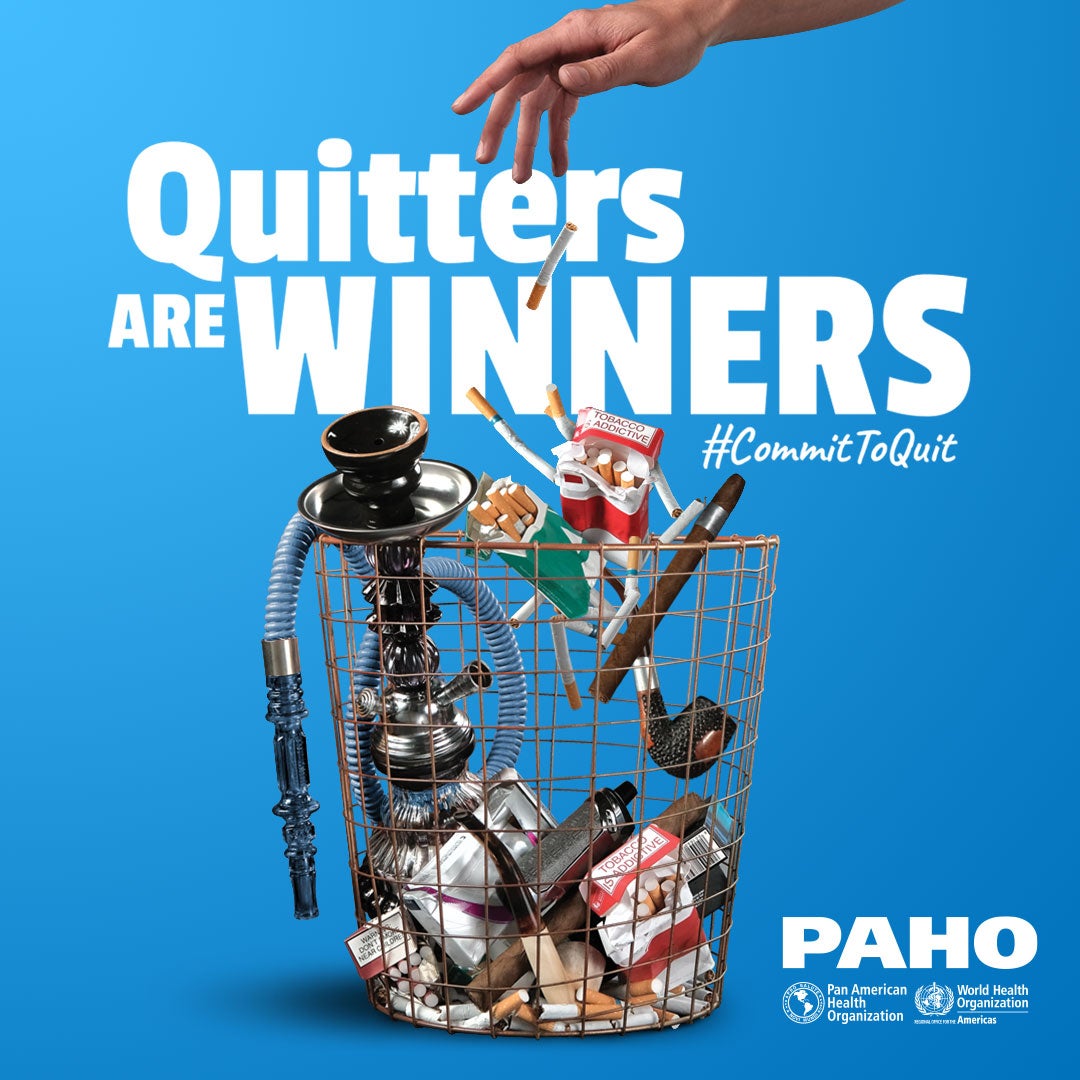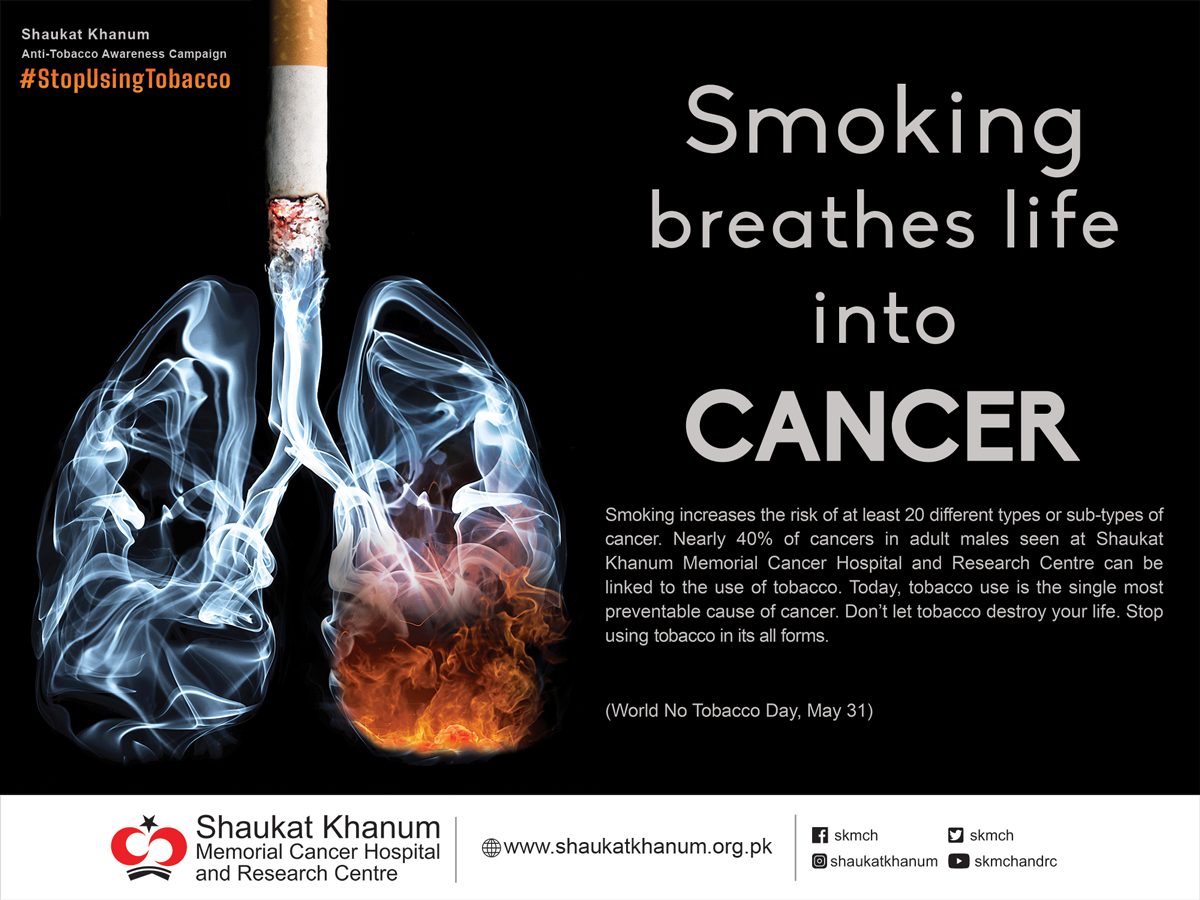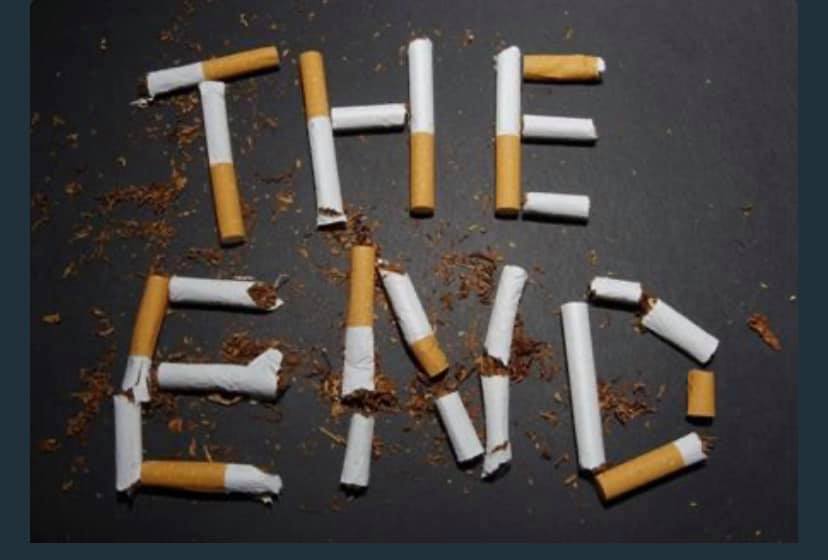The World Health Organization designates May 31st as World No Tobacco Day, a day to encourage people to quit smoking. The theme for 2021 is Commit To Quit. And considering the combined effects of COVID-19 and being a smoker, there’s good reason to quit.
World No Tobacco Day 2021 campaign – Commit to Quit
The saying goes that “quitters never win,” but in the case of tobacco, quitters are the real winners.
When the news came out that smokers were more likely to develop severe disease with COVID-19 compared to non-smokers, it triggered millions of smokers to want to quit tobacco. But without adequate support, quitting can be incredibly challenging.
The nicotine found in tobacco is highly addictive and creates dependence. The behavioural and emotional ties to tobacco use – like having a cigarette with your coffee, craving tobacco, feelings of sadness or stress – make it hard to kick the habit.
With professional support and cessation services, tobacco users double their chances of quitting successfully.
Currently, over 70% of the 1.3 billion tobacco users worldwide lack access to the tools they need to quit successfully. This gap in access to cessation services is only further exacerbated in the last year as the health workforce has been mobilized to handle the pandemic.
That’s why WHO launched a year-long campaign for World No Tobacco Day’s – “Commit to Quit” theme. The campaign aims to empower 100 million tobacco users to make a quit attempt by creating networks of support and increasing access to services proven to help tobacco users quit successfully.
70% of smokers may have no access to help in quitting, but 100% of smokers including children under 14 in developing countries have daily access to tobacco products and advertising that encourages it with few laws restricting it. As laws restricted smoking in wealthy countries and incomes in developing countries grew, the death merchants (tobacco companies) switched their focus. Governments in wealthy G20 countries allow and encourage them to predate on children and call it “international trade” and a “domestic problem in their country, not ours”. I call it racism, because the G20 countries are mostly white and developing countries are mostly Brown and Black. (Most of the tobacco peddlars are in the US or UK, but there’s one each in China and Japan.)
A big part of the problem is money. Tobacco wastes health care resources on treatment, and it’s not taxed enough. The World Health Organization estimates US$1.4 trillion is wasted annually due to tobacco. Australia did the right thing by raising cigarette prices (AUD$35 for a pack of 20 coffin nails, or US$27) but here in Taiwan, it’s still a piddling NT$100 (US$3.60). It’s still profitable to sell death, so they do.
The COVID-19 pandemic makes quitting and prevention even more important. Contrary to myths, smoking and vaping increases the likelihood of dying from COVID-19. Smoking does NOT “protect” them. Multiple reputable sources confirm this, only those taking money from the tobacco industry disagree.
More below the fold.

Smokers and their drug dealers have long repeated lies like “freedumb of choice!”, “relaxation!” and “if you don’t like it, leave!” So a five year old child who doesn’t like smoke should pack up and leave home when the parents are smokers? And now they peddle the tobacco industry’s lie that “smoking protects against COVID-19!” Propaganda and bribing “scientists” is a big part of the tobacco industry’s tactics (also mentioned in the followup item).
New report: Tobacco industry-funded group obscures its ties to infiltrate scientific journals
May 3, 2021
Researchers affiliated with the Foundation for a Smoke Free World – an organization funded entirely by tobacco company Philip Morris International – and its staff members failed to disclose tobacco industry links and relied on confusion about the organization to leverage tobacco industry research for publication in reputable scientific journals, according to research published in Tobacco Control. In addition to Big Tobacco’s obfuscation, research journals fail to apply existing conflict of interest policies on tobacco industry-funded research, underscoring the need for stronger enforcement of policies that clarify ties to the tobacco industry.
Propagating the lie of “protection against COVID-19!” is critical to the tobacco industry. They know full well that a proven link between smoking and a disease that kills the lungs will cause millions to quit smoking.
From Nature:
Are smokers protected against SARS-CoV-2 infection (COVID-19)? The origins of the myth
npj Primary Care Respiratory Medicine volume 31, Article number: 10 (2021)
It seems the tobacco industry benefited from the (social) media hype, since exposure to claims about a protective effect of smoking was associated with an increase in tobacco consumption among Chinese citizens during the pandemic6. Also in other countries, an increase in tobacco consumption among smokers has been reported7,8, possibly influenced by this hype. In France, researchers first suggested that nicotine may play a role in protecting smokers9, triggering a run on nicotine products among the general public. Interestingly, the lead author of this research has been funded by the tobacco industry in the past, and also other researchers who have made similar claims can be linked with the tobacco industry, indicating a possible conflict of interest. According to the Global Center for Good Governance in Tobacco Control, the tobacco industry was actively involved in downplaying the role of smoking in COVID-19 by spreading claims that smoking or vaping protects against COVID-1910.
From the British Medical Journal:
Current smoking and COVID-19 risk: results from a population symptom app in over 2.4 million people
Results Between 24 March 2020 and 23 April 2020, data were available on 2 401 982 participants, mean (SD) age 43.6 (15.1) years, 63.3% female, overall smoking prevalence 11.0%. 834 437 (35%) participants reported being unwell and entered one or more symptoms. Current smokers were more likely to report symptoms suggesting a diagnosis of COVID-19; classic symptoms adjusted OR (95% CI) 1.14 (1.10 to 1.18); >5 symptoms 1.29 (1.26 to 1.31); >10 symptoms 1.50 (1.42 to 1.58). The pattern of association between reported symptoms did not vary between smokers and non-smokers.
From SAGE Journals, February 2021:
Smoking and COVID-19: A Scoping Review
Smoking affects a person’s overall health and damages nearly every organ of the body. Since smoking tobacco affects and damages the lungs, it increases the risk of respiratory infections and makes it easier for the coronavirus disease (COVID-19) to invade the lung tissue, causing more severe symptoms and increasing the risk of death. [. . .] Several epidemiological studies have found a higher smoking prevalence among COVID-19 infected patients. Also, studies had shown that people with respiratory diseases caused by tobacco use are at higher risk of developing severe COVID-19 symptoms. Studies have shown that in vitro, the acute exposure allows for more severe proximal airway epithelial disease from SARS-CoV-2 by reducing the mucosal innate immune response and the proliferation of airway basal stem cells and has implications for disease spread and severity in people exposed to cigarette smoke, with a more severe viral infection and cell death. Smoker patients with different comorbidities are at higher risk of contracting the COVID-19 virus and have a worse prognosis for the virus as well as for their comorbidities. Further investigations of the interaction between smoking and COVID-19 are warranted to accurately assess the risk of contracting COVID-19 among smokers, and the progression to mechanical ventilation or death in patients who suffer from it.
From Pulmonology Journal, May-June 2021:
Cigarette smoking and COVID-19
In a recent editorial published on tobacco and COVID-19, the Sociedade Portuguesa de Pneumologia raises doubts and caution about the data coming from the medical and scientific community regarding the hypothesis that cigarette smoking or nicotine could be “protective” against COVID-19, recommending that this information should not be taken as an invitation to start smoking or to delay giving it up to avoid SARS-CoV-2 infection or its complications.
The role of cigarette smoking/nicotine (or whatever else is contained within cigarette smoke) in the scientific discussion on COVID-19 ignores the fact that smoke cessation has to be discouraged to avoid COVID-19 pulmonary complications (this seems obvious for scientists and physicians) but references the scientific importance of the strong epidemiological data coming from all the countries that hospitalized patients with SARS-CoV-2 related pneumonia show quite low percentages of active smokers.
[. . .]
In the case of active smoking and COVID-19, to hide ones head in the sand will not help rapid scientific progress in the discovery of the pathophysiology of this disease and of its possible therapeutic strategies.
Or hide one’s head in the ashtray, so to speak.
Here are some other reputable sources on the topic:
Pan-American Health Organization
Very Well Health, , a publication of the Cleveland Clinic:
What to Know About Smoking and COVID-19
April 27, 2021
Frequently Asked Questions
Can COVID-19 Be Spread Through Secondhand Smoke?
Possibly. The novel coronavirus is transmitted by droplets in most cases, but it can also be airborne. Documented cases of transmission have occurred among choir groups, demonstrating that the virus can be released into the air by exhalation. The act of smoking and the blowing of secondhand smoke could put others around you at risk if you are infected with the virus.
Does Smoking Lead to a More Severe Case of COVID-19?
Yes. New research indicates that smokers were more likely to be hospitalized and become severely ill with COVID-19 than non-smokers.
Additionally, smokers are more likely to develop a number of medical conditions like cancer and COPD, which increase the risk of severe illness with COVID-19.
Does Vaping Count?
Yes. Vaping is sometimes touted as being less damaging to the lungs than cigarette smoke, but there is evidence that the risk of COVID-19 is five times higher in young adults who use e-cigarettes.9 Vaping also involves hand-to-mouth contact with an e-cigarette, which could potentially increase the risk of COVID-19 transmission.
Indian Express, May 29 2021: Smokers face up to 50% higher risk of developing severe disease, death from COVID-19
Ignorance and selfishness play a big role in smokers’ attitudes towards COVID-19 and smoking.
From Asahi-Shimbun, May 31 2021:
Survey: Smokers puffing more, downplaying risks of COVID-19
Despite the heightened risk of catching a potentially fatal respiratory disease, smokers who are puffing more outnumber those who are smoking less during the COVID-19 pandemic, according to a National Cancer Center survey.
The trend for the increased tobacco use is related to the new normal of teleworking or staying at home, according to the survey, which was released on May 31 to coincide with World No Tobacco Day, an initiative by the World Health Organization.
The survey also showed that smokers largely underestimate their risk of catching the novel coronavirus in smoking areas and developing serious COVID-19 symptoms compared with the understanding of the risks by their nonsmoking counterparts.
The online survey was conducted in March, with 2,000 men and women responding. Half of them were smokers.
According to the results, 18 percent of the smokers said they were smoking more than during the pre-pandemic days, while 11 percent answered the opposite.
One percent said they quit smoking after the public health crisis hit. The rest of the smoking respondents said their habits remained the same as before.
Of the 180 smokers who are smoking more, 49 percent, the largest share, cited increased stress as main reason for doing so, while 34 percent pointed to the lack of no-smoking rules at home in contrast to the policies of their offices.
Ten percent replied that they do not need to worry about how others view their smoking habits while at home.
“Do not need to worry about how others view their smoking habits while at home”? If you’re single, you’re stinking up the apartment. If you have a family, you’re selfishly poisoning them as a captive audience.
Smoking is an inherently selfish and self-destructive act.

Here’s a good background to add to your phone or facebook page:


